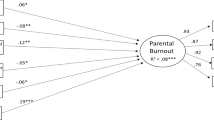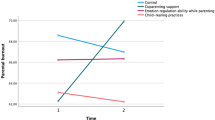Abstract
Parenting perfectionism, especially the dimension of perfectionistic concerns—preoccupation with self-criticism including concern over mistakes and doubts about own behaviors—, has been shown to be a weighty factor for parental burnout. Drawing on the Balance between Risks and Resources (BR2) theory of parental burnout, this paper examines whether emotional competence could moderate/buffer the effect of parenting perfectionism on parental burnout. We investigated this question in two independent samples of parents collected in Belgium (N = 347) and Poland (N = 377). The results of both studies show that emotional competence cancels out the detrimental effect of perfectionistic concerns on parental burnout. Beyond its contribution to parenting perfectionism and emotional competence literatures, the present article also provides further evidence of the potential of the BR2 theory of parental burnout.

Similar content being viewed by others
Data Availability
Neither of the experiments reported in this article was formally preregistered. However, the database of study variables and the supplementary material have been made available on a permanent third-party archive, Open Science Framework: https://osf.io/na34j/?view_only=8db9312c2bcb426f98a7bab996f02573.
Code Availability
Not applicable.
References
Bayot, M., Roskam, I., Gallée, L., & Mikolajczak, M. (2020). When too much is harmful: Interactions between intra- and interpersonal emotional competence in the case of parental burnout. Journal of Individual Differences, 42, 1–8. https://doi.org/10.1027/1614-0001/a000324.
Brasseur, S., Grégoire, J., Bourdu, R., & Mikolajczak, M. (2013). The profile of emotional competence (PEC): Development and validation of a self-reported measure that fits dimensions of emotional competence theory. PLoS One, 8(5), e62635. https://doi.org/10.1371/journal.pone.0062635.
Brianda, M. E., Roskam, I., Gross, J. J., Franssen, A., Kapala, F., G, F., & Mikolajczak, M. (2020). Treating parental burnout: Impact of two treatment modalities on burnout symptoms, emotions, hair cortisol, and parental neglect and violence. Psychotherapy and Psychosomatics, 89, 330–332.
Chang, E., Lee, A., Byeon, E., Seong, H., & Lee, S. M. (2016). The mediating effect of motivational types in the relationship between perfectionism and academic burnout. Personality and Individual Differences, 89, 202–210. https://doi.org/10.1016/j.paid.2015.10.010.
Ciarrochi, J., Deane, F. P., & Anderson, S. (2002). Emotional intelligence moderates the relationship between stress and mental health. Personality and Individual Differences, 32(2), 197–209. https://doi.org/10.1016/S0191-8869(01)00012-5.
Crandall, A., Deater-Deckard, K., & Riley, A. W. (2015). Maternal emotion and cognitive control capacities and parenting: A conceptual framework. Developmental Review, 36, 105–126. https://doi.org/10.1016/j.dr.2015.01.004.
Daly, M. (2007). Parenting in contemporary Europe: A positive approach. Strasbourg: Council of Europe Publishing.
Dunlop, W. L. (2015). Contextualized personality, beyond traits. European Journal of Personality, 29(3), 310–325. https://doi.org/10.1002/per.1995.
Eibach, R. P., & Mock, S. E. (2011). Idealizing parenthood to rationalize parental investments. Psychological Science, 22(2), 203–208. https://doi.org/10.1177/0956797610397057.
Faircloth, C. (2014). Intensive parenting and the expansion of parenting. In E. Lee, J. Bristow, C. Faircloth, & J. Macvarish (Eds.), Parenting culture studies (pp. 25–50). London: Palgrave Macmillan.
Finzi-Dottan, R., Triwitz, Y. S., & Golubchik, P. (2011). Predictors of stress-related growth in parents of children with ADHD. Research in Developmental Disabilities, 32(2), 510–519. https://doi.org/10.1016/j.ridd.2010.12.032.
Furutani, K., Kawamoto, T., Alimardani, M., & Nakashima, K. (2020). Exhausted parents in Japan: Preliminary validation of the Japanese version of the parental burnout assessment. New Directions for Child and Adolescent Development, 174. https://doi.org/10.1002/cad.20371.
Hill, A. P., & Curran, T. (2016). Multidimensional perfectionism and burnout: A meta-analysis. Personality and Social Psychology Review, 20(3), 269–288. https://doi.org/10.1177/1088868315596286.
Hill, R. W., Huelsman, T. J., & Araujo, G. (2010). Perfectionistic concerns suppress associations between perfectionistic strivings and positive life outcomes. Personality and Individual Differences, 48(5), 584–589. https://doi.org/10.1016/j.paid.2009.12.011.
Hubert, S., & Aujoulat, I. (2018). Parental burnout: When exhausted mothers open up. Frontiers in Psychology, 9, 1021.
Karahan, T. F., & Yalçin, B. (2009). The effects of an emotional intelligence skills training program on anxiety, burnout and glycemic control in type 2 diabetes mellitus patients. Turkiye Klinikleri Journal of Medical Sciences, 29(1), 16–24.
Karimi, L., Leggat, S. G., Donohue, L., Farrell, G., & Couper, G. E. (2014). Emotional rescue: The role of emotional intelligence and emotional labour on well-being and job-stress among community nurses. Journal of Advanced Nursing, 70(1), 176–186. https://doi.org/10.1111/jan.12185.
Kawamoto, T., & Furutani, K. (2018). The mediating role of intolerance of uncertainty on the relationships between perfectionism dimensions and psychological adjustment/maladjustment among mothers. Personality and Individual Differences, 122, 62–67. https://doi.org/10.1016/j.paid.2017.10.008.
Kawamoto, T., Furutani, K., & Alimardani, M. (2018). Preliminary validation of Japanese version of the parental burnout inventory and its relationship with perfectionism. Frontiers in Psychology, 9. https://doi.org/10.3389/fpsyg.2018.00970.
Kotsou, I., Nelis, D., Grégoire, J., & Mikolajczak, M. (2011). Emotional plasticity: Conditions and effects of improving emotional competence in adulthood. Journal of Applied Psychology, 96(4), 827–839. https://doi.org/10.1037/a0023047.
Lan, P.-C. (2018). Raising global families: Parenting, immigration, and class in Taiwan and the US. Stanford University Press.
Lin, G.-X., Hansotte, L., Szczygieł, D., Roskam, I., Meeussen, L., & Mikolajczak, M. (2020). Parenting with a smile: Display rules, regulatory effort, and parental burnout [Submitted for publication]. https://doi.org/10.31234/osf.io/ewjyn
Lindström, C., Åman, J., & Norberg, A. L. (2011). Parental burnout in relation to sociodemographic, psychosocial and personality factors as well as disease duration and glycaemic control in children with Type 1 diabetes mellitus. Acta Paediatrica, 100, 1011–1017.
Mayer, J. D., & Salovey, P. (1997). What is emotional intelligence? In P. Salovey & D. J. Sluyter (Eds.), Emotional development and emotional intelligence: Educational implications (pp. 3–31). New York: Basic Books.
Mikolajczak, M., Brianda, M. E., Avalosse, H., & Roskam, I. (2018). Consequences of parental burnout: Its specific effect on child neglect and violence. Child Abuse & Neglect, 80, 134–145. https://doi.org/10.1016/j.chiabu.2018.03.025.
Mikolajczak, M., Gross, J. J., & Roskam, I. (2019). Parental burnout: What is it and why does it matter? Clinical Psychological Science, 7(6), 1319–1329.
Mikolajczak, M., Menil, C., & Luminet, O. (2007). Explaining the protective effect of trait emotional intelligence regarding occupational stress: Exploration of emotional labour processes. Journal of Research in Personality, 41(5), 1107–1117. https://doi.org/10.1016/j.jrp.2007.01.003.
Mikolajczak, M., Petrides, K. V., Coumans, N., & Luminet, O. (2009). The moderating effect of trait emotional intelligence on mood deterioration following laboratory-induced stress. International Journal of Clinical and Health Psychology, 9(3), 455–477.
Mikolajczak, M., Raes, M.-E., Avalosse, H., & Roskam, I. (2018). Exhausted parents: Sociodemographic, child-related, parent-related, parenting and family-functioning correlates of parental burnout. Journal of Child and Family Studies, 27(2), 602–614.
Mikolajczak, M., & Roskam, I. (2018). A theoretical and clinical framework for parental burnout: The balance between risks and resources (BR(2)). Frontiers in Psychology, 9. https://doi.org/10.3389/fpsyg.2018.00886.
Mikolajczak, M., Roy, E., Luminet, O., Fillée, C., & de Timary, P. (2007). The moderating impact of emotional intelligence on free cortisol responses to stress. Psychoneuroendocrinology, 32(8), 1000–1012. https://doi.org/10.1016/j.psyneuen.2007.07.009.
Nelis, D., Kotsou, I., Quoidbach, J., Hansenne, M., Weytens, F., Dupuis, P., & Mikolajczak, M. (2011). Increasing emotional competence improves psychological and physical well-being, social relationships, and employability. Emotion, 11(2), 354–366. https://doi.org/10.1037/a0021554.
Nelson, M. K., & Nelson, P. M. K. (2010). Parenting out of control: Anxious parents in uncertain times. New York: New York University Press.
Petrides, K. V., Mikolajczak, M., Mavroveli, S., Sanchez-Ruiz, M.-J., Furnham, A., & Pérez-González, J.-C. (2016). Developments in trait emotional intelligence research. Emotion Review, 8(4), 335–341. https://doi.org/10.1177/1754073916650493.
Roskam, I., Aguiar, J., Akgun, E., Arikan, G., Artavia, M., Avalosse, H., Aunola, K., Bader, M., Bahati, C., Barham, E. J., Besson, E., Beyers, W., Boujut, E., Brianda, M. E., Brytek-Matera, A., Carbonneau, N., César, F., Chen, B.-B., Dorard, G., et al. (2021). Parental burnout around the globe: A 42-country study. Affective Science. https://doi.org/10.1007/s42761-020-00028-4.
Roskam, I., Brianda, M.-E., & Mikolajczak, M. (2018). A step forward in the conceptualization and measurement of parental burnout: The parental burnout assessment (PBA). Frontiers in Psychology, 9. https://doi.org/10.3389/fpsyg.2018.00758.
Salami, S. O., & Ajitoni, S. O. (2016). Job characteristics and burnout: The moderating roles of emotional intelligence, motivation and pay among bank employees. International Journal of Psychology, 51(5), 375–382. https://doi.org/10.1002/ijop.12180.
Simmons, J. P., Nelson, L. D., & Simonsohn, U. (2011). False-positive psychology: Undisclosed flexibility in data collection and analysis allows presenting anything as significant. Psychological Science, 22(11), 1359–1366. https://doi.org/10.1177/0956797611417632.
Snell, W. E., Overbey, G. A., & Brewer, A. L. (2005). Parenting perfectionism and the parenting role. Personality and Individual Differences, 39(3), 613–624.
Sorkkila, M., & Aunola, K. (2020). Risk factors for parental burnout among Finnish parents: The role of socially prescribed perfectionism. Journal of Child and Family Studies, 29(3), 648–659. https://doi.org/10.1007/s10826-019-01607-1.
Szczygiel, D., & Mikolajczak, M. (2018). Is it enough to be an extrovert to be liked? Emotional competence moderates the relationship between extraversion and peer-rated likeability. Frontiers in Psychology., 9. https://doi.org/10.3389/fpsyg.2018.00804.
Szczygieł, D., Sekulowicz, M., Kwiatkowski, P., Roskam, I., & Mikolajczak, M. (2020). Validation of the polish version of the parental burnout assessment (PBA). New Directions in Child and Adolescent Development, 174, 137–158. https://doi.org/10.1002/cad.20385.
Funding
M.M., I.R., and G.-X.L. were supported by a Coordinated Research Grant from the French Community of Belgium (ARC Grant n°19/24–100). This fund did not exert any influence or censorship of any kind on the present work.
Author information
Authors and Affiliations
Contributions
Moïra Mikolajczak (M.M.), Logan Hansotte (L.H.), and Dorota Szczygieł (D.S.) developed the study concept and the study design from which the current data were drawn. L.H. and D.S. collected the data. Gao-Xian Lin (G.-X.L.) suggested using the data to investigate the interactive effect of perfectionism and emotional competence on parental burnout. G.-X.L. performed the data analyses and interpretation. G.-X.L. and M.M. drafted the manuscript. D.S. and Isabelle Roskam (I.R.) provided revisions. All authors approved the final version of the manuscript for submission.
Corresponding author
Ethics declarations
Protections of Research Participants
The study was carried out in accordance with the provisions of the World Medical Association Declaration of Helsinki.
Conflicts of Interest/Competing Interests
M.M. and I.R. founded the Training Institute for Parental Burnout (TIPB) which delivers training on PB to professionals. The TIPB did not participate in the funding of this study nor did it influence the process or the results in any manner.
Additional information
Publisher’s Note
Springer Nature remains neutral with regard to jurisdictional claims in published maps and institutional affiliations.
Dorota Szczygiel and Logan Hansotte share co-first authorship with Gao-Xian Lin.
Supplementary Information
ESM
(DOCX 33.6 kb)
Appendix 1
Appendix 1
Rights and permissions
About this article
Cite this article
Lin, GX., Szczygieł, D., Hansotte, L. et al. Aiming to be perfect parents increases the risk of parental burnout, but emotional competence mitigates it. Curr Psychol 42, 1362–1370 (2023). https://doi.org/10.1007/s12144-021-01509-w
Accepted:
Published:
Issue Date:
DOI: https://doi.org/10.1007/s12144-021-01509-w




